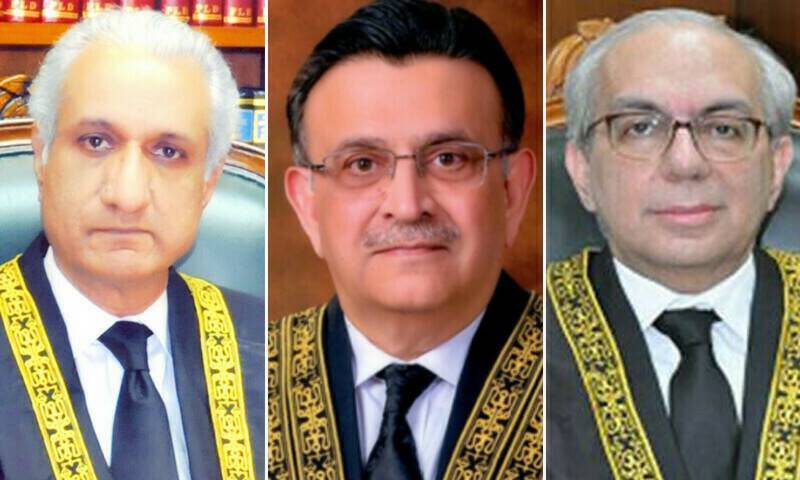Islamabad (Web Desk): Chief Justice of Pakistan (CJP) Umar Ata Bandial on Thursday said that courts cannot force political parties to hold negotiations and urged the ruling alliance and the opposition to sit together for talks on elections for the sake of the Constitution.
Earlier today, a three-member bench of the SC headed by the CJP and comprising Justice Munib Akhtar and Justice Ijaz ul Ahsan resumed hearing the election delay suo motu case.
During the hearing today, the court raised questions over the government’s “seriousness” regarding holding negotiations.
The apex court had before Eid ul Fitr directed the political parties to hold a dialogue in a bid to reach a consensus on the date of elections in the country.
The hearing was then adjourned till today (April 27) after the key ruling parties — Pakistan Peoples Party (PPP) and Pakistan Muslim League-Nawaz (PML-N) — assured the SC they would sit with PTI and try to find a solution on the election date.
But the political parties failed to initiate a dialogue to decide on a date for the polls as directed by the top court.
However, the ruling alliance proposed the formation of a 10-member parliamentary committee with equal representation from both sides for talks on holding elections across the country on the same date, in line with the SC order.
Meanwhile, the Pakistan Tehreek-e-Insaf (PTI) formed a three-member committee including Shah Mahmood Qureshi, Asad Umar and Fawad Chaudhry.
At the outset of the hearing, Attorney General for Pakistan (AGP) Mansoor Usman Awan informed the court that the first contact between the government and the opposition took place on April 19 and it was decided that a meeting will be held on April 26.
He added that PML-N’s Ayaz Sadiq and Khawaja Saad Rafique met PTI’s Asad Qaiser on April 25, however, the latter said he was not authorised to decide on the matter of talks.
Here, the CJP asked: “After Asad Qaiser’s refusal, was an attempt made to find out who is authorised for the talks?”
The AGP replied that despite differences, the government and PTI had differences found a way forward and apprised the court about the committee formed by Senate Chairman Sadiq Sanjarani for political dialogue.
“The Senate chairman has asked both the government and opposition to nominate four names each [for the talks],” Awan said, adding that he had found out from the media that PTI’s Qureshi was authorised for the negotiations.
“In what capacity was the Chairman Senate contacted?” Justice Bandial asked, noting that Sanjarani was neither the representative of the government nor the opposition. “If the government was serious about negotiations, it would have made efforts itself.
The CJP remarked that the court can’t force the government into negotiations. He said that the court only wanted implementation of the Constitution so that a way could be found out of the current crisis.
“We don’t need any explanations, tell us a solution,” he said, highlighting that it would take Sanjarani’s committee time to initiate the talks.
At that, PPP lawyer Farooq H. Naek said that all the coalition parties had agreed on holding talks with the PTI and Senate was the only forum where all the political parties were present.
Soon after hearing the arguments from both sides, the court completed the proceedings for the day.
"A written order will be issued for this case," the CJ said adding that "the court will issue appropriate orders".
On April 4, a three-member SC bench comprising Chief Justice of Pakistan (CJP) Umar Ata Bandial, Justice Ijazul Ahsan and Justice Munib Akhtar had directed the electoral body to hold elections in Punjab on May 14, and the federal government to provide funds amounting to Rs21 billion to ECP by April 10.
The SC on April 14, had ordered the SBP to release funds worth Rs21 billion to the ECP for polls in Punjab and KP and send an “appropriate communication” to this effect to the finance ministry by April 17.
Following the court orders, the central bank allocated the funds and sought the finance ministry’s nod to release the amount to the ECP. But, the government’s approval was required to release the amount from the FCF while the government had to get the National Assembly’s approval for its release.
Subsequently, on April 17, the coalition government managed through the NA yet another rejection of its own demand for the provision of Rs21bn as a supplementary grant to the ECP for holding polls in the two provinces — nullifying the SC’s third directive for the release of funds for the purpose.
On Wednesday, while addressing separate meetings of the parties in the ruling coalition, PML-N parliamentary party and cabinet, Prime Minister Shehbaz Sharif said elections were an issue that needed to be decided in parliament and the appropriate time to conduct them was either in October or November.
Meanwhile, National Assembly Speaker Raja Pervaiz Ashraf, on demand of the lawmakers, on Wednesday wrote a letter to the CJP saying that “it is best to leave the resolution of political matters by the parliament and the political parties”.
The lawmakers unanimously said that the authority of parliament should not be undermined by any individual or entity and stressed that the legislative should exercise its power of enacting crucial legislation.


